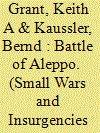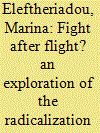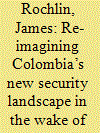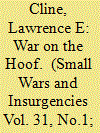|
|
|
Sort Order |
|
|
|
Items / Page
|
|
|
|
|
|
|
| Srl | Item |
| 1 |
ID:
173822


|
|
|
|
|
| Summary/Abstract |
Civilian victimization, whether deliberate or collateral, is a common occurrence in civil war. This study investigates patterns of civilian victimization during the 5-year Battle of Aleppo, a major campaign of the Syrian Civil War in which there were 24,462 documented civilian fatalities. We argue that the primary belligerents and their external patrons respond to shifts in the conflict’s strategic balance of power, employing more indiscriminate force when their opponent is gaining advantage, resulting in higher civilian fatalities. A quantitative analysis of the Battle of Aleppo models weekly civilian fatalities as a function of belligerents’ conflict initiation interacted with regime and rebel offensives aimed at shifting the status quo. While regime-initiated conflict events appear to be the primary determinant of civilian fatalities, our analysis finds that conflict events initiated by the opposition forces during periods of rebel offensive gains are associated with fewer civilian casualties, while pro-government external intervention during rebel offensives is associated with elevated civilian fatalities. We expand on these findings through a focused case study of third party intervention during the final year of the battle, with emphasis on the Russian intervention on behalf of the Syrian Regime that broke the opposition’s final counteroffensive.
|
|
|
|
|
|
|
|
|
|
|
|
|
|
|
|
| 2 |
ID:
173823


|
|
|
|
|
| Summary/Abstract |
Drawing on a survey of asylum seekers, the article provides a security assessment of the ‘refugee experience’ in Greece. This exploration of the ‘refugee situation’ on Europe’s eastern shore touches upon refugees’ prior and present grievances, the local and imported ‘radical milieu’ and (Greek) host state’s will and capacity to implement sustainable and effective policies. The paper demonstrates that, although Greece lacks a developed radical milieu that could facilitate radicalization, Greece’s policy of ‘uninvolved tolerance’ creates a vacuum that might be filled by radical groups in the future. Also, with the exception of minors’ education, Greece scores low in most socio-economic indicators that delineate the ‘refugee experience’. In this environment, scarce employment opportunities and dependence on external sources for life-sustainment interweave with institutionalization and negative coping mechanisms. These silent and largely hidden from the public eye processes might become the ingredients of future radicalization.
|
|
|
|
|
|
|
|
|
|
|
|
|
|
|
|
| 3 |
ID:
173829


|
|
|
|
|
| Summary/Abstract |
After two centuries of almost non-stop warfare since Independence in 1819, Colombia now finds itself at a crossroads. One path entails the construction of a culture of peace in the aftermath of the 2017 disarmament of the Fuerzas Armadas Revolucionarias de Colombia (FARC). Another trajectory entails a profound transformation of war. Colombia is increasingly leaning toward reconfigured warfare. The most prominent feature of this redefined security panorama is the re-conception of boundaries, both physical and ideational. One is reminded of the chilling observation of Gabriel García Márquez that a country ‘condemned to one hundred years of solitude did not have a second opportunity on earth.’
|
|
|
|
|
|
|
|
|
|
|
|
|
|
|
|
| 4 |
ID:
173827


|
|
|
|
|
| Summary/Abstract |
The paper explores connections between corruption and military effectiveness. It positions efforts to defeat Boko Haram in Nigeria within the doorstep of governance challenges. The empirical evidence has documented how the ebb and flow of corruption affected the effectiveness of military responses to defeat Boko Haram. The findings reveal that corruption in the defence sector weakened the military’s capacity to respond to security threats swiftly. However, efforts to address corruption positively led to enhanced military capacity, leading to a temporary victory.
|
|
|
|
|
|
|
|
|
|
|
|
|
|
|
|
| 5 |
ID:
173826


|
|
|
|
|
| Summary/Abstract |
Compelling trends in international affairs, such as the rise of private military companies (PMCs) and the increasing fragility of many nation-states, have caused some observers to question whether the state-centric, Westphalian world-order will exist in perpetuity. In this light, epochal change theory posits that world-orders have constantly changed and we are now witnessing a transition to a new one. In this paper, I discuss how small groups of private equity investors now control impressive war-fighting capabilities, and that this acquisition of PMCs by private equity firms is further evidence of epochal change theory.
|
|
|
|
|
|
|
|
|
|
|
|
|
|
|
|
| 6 |
ID:
173828


|
|
|
|
|
| Summary/Abstract |
This article examines the strategies employed – or not employed – in the Peruvian counterinsurgency campaign against the Sendero Luminoso insurgent group. Using Carl von Clausewitz’s and Colin Gray’s strategic theories as a lens through which to analyze the conflict, the aim here is to show what role strategy played in the eventual defeat of this insurgency and what obstacles the Peruvian state and its armed forces faced in enacting good strategy. Specifically, the utilization of the ‘strategy bridge’ concept is investigated. For a large part of this conflict, the strategy bridge linking the civil authorities with the military and its activities was missing. Once there emerged a clear understanding of the importance of ends, ways and means working in harmony could an effective counterinsurgency campaign flourish.
|
|
|
|
|
|
|
|
|
|
|
|
|
|
|
|
| 7 |
ID:
173824


|
|
|
|
|
| Summary/Abstract |
Though the Kurdistan Workers’ Party (PKK) has been able to sustain a rural insurgency in Turkey over several decades, it was unable to sustain the urban insurgency it began in July 2015. This paper looks at the period July 2015 and December 2016 to explore the reasons why, despite the PKK’s experience conducting an insurgency and demonstrated popular support, they were unable to sustain an urban insurgency. It then uses this example to examine the broader conditions under which urban insurgencies may be sustainable. In particular, the hypotheses in this paper look at the complex human and physical landscape of urban environments and the impact of pre-existing social networks.
|
|
|
|
|
|
|
|
|
|
|
|
|
|
|
|
| 8 |
ID:
173825


|
|
|
|
|
| Summary/Abstract |
Cattle rustling and conflicts between herders and farmers have long existed in several areas in Africas. In recent years, however, both security challenges have increased exponentially. The extent of the problem, exacerbated both by organized crime links and corruption, has reached levels in which it should now be viewed as a national security issue. This particularly is the case due to most of the criminality and conflicts occurring in border regions and involving cross-border operations. The rise of local uncontrolled armed groups, significant conflict between ethnic groups, inability of the regional governments to gain control of peripheral areas, and the increased politicization of the conflicts all indicate an environment that is highly conducive for creating the rise of insurgent movements.
|
|
|
|
|
|
|
|
|
|
|
|
|
|
|
|
|
|
|
|
|